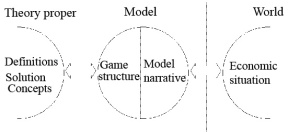[embedded content]
Read More »L’un part, l’autre reste
L’un part, l’autre reste [embedded content]
Read More »‘Nobel prize’ winner Esther Duflo on how to fight poverty
‘Nobel prize’ winner Esther Duflo on how to fight poverty [embedded content] Today The Royal Swedish Academy of Sciences announced that it has decided to award The Sveriges Riksbank Prize in Economic Sciences in Memory of Alfred Nobel for 2019 to Esther Duflo, Abhijit Banerjee and Michael Kremer. Great choice! In one single stroke the academy doubled the number of women having received the ‘Nobel prize’ in economics. Compared with most other recipients for...
Read More »On the limited applicability of game theory
On the limited applicability of game theory Many mainstream economists – still — think that game theory is useful and can be applied to real-life and give important and interesting results. That, however, is a rather unsubstantiated view. What game theory does is, strictly seen, nothing more than investigating the logic of behaviour among non-existant robot-imitations of humans. Knowing how those ‘rational fools’ play games do not help us to decide and act...
Read More »The limits of extrapolation in economics
The limits of extrapolation in economics There are two basic challenges that confront any account of extrapolation that seeks to resolve the shortcomings of simple induction. One challenge, which I call extrapolator’s circle, arises from the fact that extrapolation is worthwhile only when there are important limitations on what one can learn about the target by studying it directly. The challenge, then, is to explain how the suitability of the model as a...
Read More »Das Jahr in dem die Mauer fiel
Das Jahr in dem die Mauer fiel [embedded content] Herausragende Dokumentation. Ohne Tränen kann man das nicht gucken.
Read More »Humble Nobel prize winner …
Humble Nobel prize winner … [embedded content]
Read More »Do economic models actually explain anything?
Do economic models actually explain anything? One of the limitations with economics is the restricted possibility to perform experiments, forcing it to mainly rely on observational studies for knowledge of real-world economies. But still — the idea of performing laboratory experiments holds a firm grip of our wish to discover (causal) relationships between economic ‘variables.’ If we only could isolate and manipulate variables in controlled environments, we...
Read More »Peter Handke wins Nobel Prize
Peter Handke wins Nobel Prize Austrian writer Peter Handke — who helped pen the screenplay for Wim Wenders’ ‘Der Himmel über Berlin’ (‘Wings of Desire’) — has been awarded the 2019 Nobel Prize for literature. Great choice! [embedded content]
Read More »Teflon economics
At least since the time of Keynes’s famous critique of Tinbergen’s econometric methods, those of us in the social science community who have been impolite enough to dare to question the preferred methods and models applied in quantitative research in general and economics more specifically, are as a rule met with disapproval. Although people seem to get very agitated and upset by the critique — just read the commentaries on this blog if you don’t believe me — defenders of...
Read More » Lars P. Syll
Lars P. Syll




